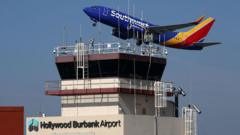Following a second consecutive failure, SpaceX's Starship rocket exploded during a test flight from Texas. Thankfully, no injuries were reported, but the incident disrupted air traffic and sent debris raining over the Caribbean, prompting safety measures from officials.
SpaceX Starship Explodes Again, Causing Debris Concerns Across the Caribbean

SpaceX Starship Explodes Again, Causing Debris Concerns Across the Caribbean
The latest test flight of SpaceX's Starship ends in a fiery explosion, raising alarms about falling debris in the region.
A SpaceX rocket met a disastrous fate moments after its launch from Texas on Thursday, leading to significant public concern over falling debris. In an alarming twist, this marked the second consecutive failure for the un-crewed Starship, which SpaceX characterized as experiencing a "rapid unscheduled disassembly" shortly after taking off. Despite the massive rocket, measuring 123 meters (403 feet), being designed for long-duration flights, it lost contact with ground control as it spun out of control. Fortunately, there were no reported injuries or infrastructure damage related to the incident.
Following the explosion, images began surfacing from onlookers in the Caribbean Sea who witnessed fiery remnants raining down from the sky. This ill-fated attempt represented the eighth mission to test the Starship, which was originally intended to re-enter Earth's orbit over the Indian Ocean after a one-hour journey. Notably, while the Super Heavy booster successfully returned to its launchpad, the main vessel failed to fulfill its mission.
SpaceX, owned by billionaire Elon Musk, promptly coordinated with safety officials to address the aftermath of the event. The company confirmed in an official statement that teams would analyze the mission data to determine the root cause of the failure, which was linked to the loss of "several" engines. The statement emphasized that each setback serves as a learning opportunity, aimed at enhancing the Starship's reliability. Additionally, SpaceX reassured the public that the rocket did not carry any toxic materials and advised that debris had fallen within designated areas.
In response to the explosion, the Federal Aviation Administration (FAA) announced temporary flight suspensions at multiple airports in Florida, including Miami and Orlando, over concerns for safety due to the falling debris. This incident follows a similar mishap from January, when a Starship rocket experienced a catastrophic failure shortly after launch. In that case, the FAA had grounded all subsequent Starship launches following the investigation, citing instances of property damage in the Caribbean.
SpaceX flight commentator Dan Huot acknowledged the experience gained from the earlier incident while speaking to reporters, highlighting how the company had indeed 'some practice at this.' The latest launch took place under scrutiny, as it occurred before the FAA concluded its investigation into the January failure. Meanwhile, authorities in the Turks and Caicos Islands expressed their commitment to keeping the public informed as they collaborated with US entities for safety measures.
Social media channels featured footage of the flaming debris as it descended over the Caribbean Sea, with residents in places like the Bahamas seeking shelter due to the frightening spectacle.
Starship holds a crucial role in Elon Musk’s aspiration to establish human presence on Mars. Described as the largest and most powerful rocket ever constructed, it is designed to be fully reusable, with plans for its use as a human lunar lander in NASA’s Artemis program, aimed at returning humans to the Moon. In upcoming years, Musk envisions Starship facilitating lengthy journeys to Mars and back, making significant advancements in space exploration.



















